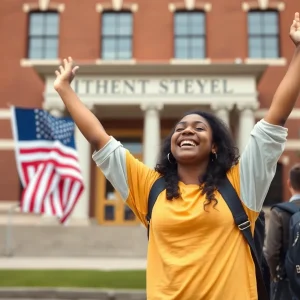100 Volunteers Plant Much-Needed Trees in Gillham Park in Honor of Earth Day
April 20, 2024, Kansas City, Mo. – In a beneficial act of service and awareness, approximately 100 volunteers gathered to plant much-needed trees on Earth Day at Kansas City’s Gillham Park. The volunteers, organized by Burns & McDonnell, a leading engineering, architecture, construction, environmental, and consulting firm, partnered with the local nonprofit Bridging the Gap and its Heartland Tree Alliance program. The event took place on Saturday, April 20, near the playground at Gillham Park, 3915 Gillham Rd.
Aging Trees Inflict Biodiversity Loss
Over recent years, Gillham Park’s tree population has aged and reached full maturity, leading to a loss of several trees. Experts anticipate more losses in the future. Planting of new trees by diversifying their ages can greatly increase the longevity of the area’s biodiversity. The participants got hands-on experience planting 15-gallon trees, learning about their positive environmental impact in the process.
Fostering Young Environmentalists
In addition to planting trees, an interactive activity was arranged for children. They were given the opportunity to paint ceramic pots and seed them before taking them home, increasing their environmental awareness from a young age.
Species Diversity for a Rich Urban Forest
The Heartland Tree Alliance made a thoughtful selection of locally adapted maturing shade trees and some flowering species for the event. The list of planted trees included Bur Oak, Northern Red Oak, Swamp White Oak, Shumard’s Oak, Kentucky Coffeetrees, Tuliptrees, Sycamore, Serviceberry, Royal Raindrop Crabapple, Bald Cypress, and Hackberry.
Environmental and Economic Benefits of Tree Planting
The organization also emphasized the environmental and economic benefits of tree planting. According to the US Department of Agriculture, trees have a “net cooling effect equivalent to 10 room-size air conditioners operating 20 hours a day.” Moreover, each tree can absorb approximately 48 lbs of carbon dioxide annually.
The event shed light on the larger issue of climate change and highlighted the role trees could play, as one of the most cost-effective solutions to this crisis. It was also stressed that the gas consumed by 13,500 homes in Kansas City could be offset by tree planting in the region. Furthermore, the existing tree population of the city, which stands at 135,000, yields a return of $123 per tree per year to the city.
This hands-on Earth Day celebration in Kansas City’s Gillham Park clearly demonstrated the significance of maintaining green spaces in our urban environment, while continuously educating the community about the broad-scale benefits of sustainability efforts.







